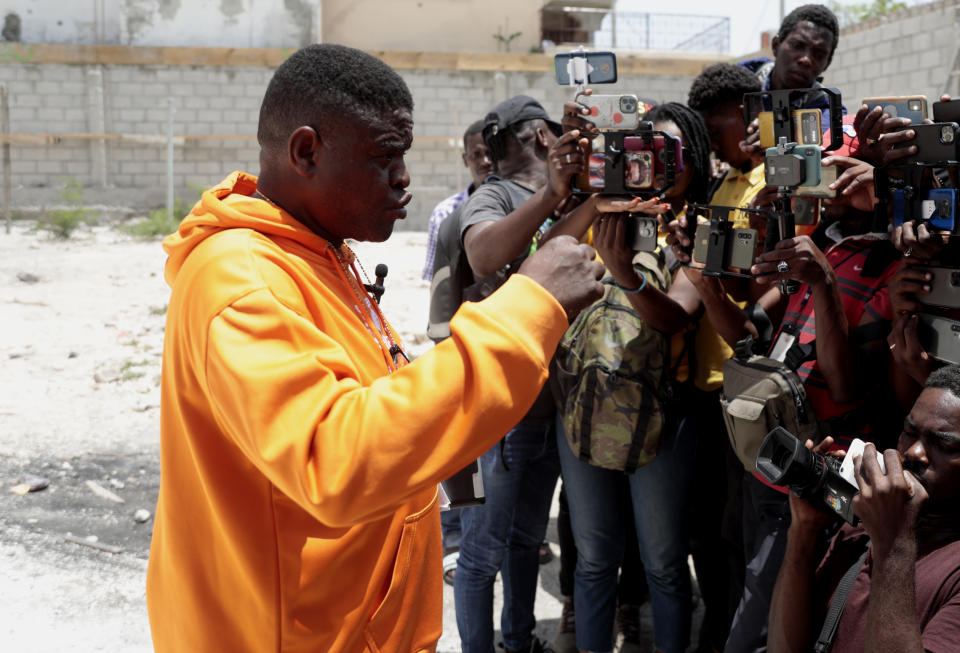Ex-Police Officer and Gang Leader Warns Against International Armed Force in Haiti
PORT-AU-PRINCE, Haiti (AP) — Jimmy Chérisier, also known as “Barbecue,” a former police officer and considered by many to be Haiti’s most powerful gang leader, issued a warning on Wednesday against any international armed force deployed to the Caribbean country if it committed any abuses. Chérisier, who leads the G9 Family and Allies gang, also called on Haitians to rise up against the government during a news conference in Port-au-Prince.
Prime Minister Ariel Henry, who has been leading Haiti since the assassination of President Jovenel Moïse in July 2021, has been advocating for the deployment of a foreign armed force to help combat the powerful gangs that now control 80% of the capital city. In late July, Kenya offered to lead a multinational force, and the United States announced earlier this month that it would propose a resolution in the U.N. Security Council to authorize a non-U.N. multinational mission.
Chérisier stated that he would welcome a foreign force if it were to arrest the prime minister and individuals he described as corrupt politicians and local police involved in the sale of ammunition and guns in Haiti’s slums. However, he warned that Haitians would resist if any international force repeated the actions of previous U.N. peacekeepers, such as committing sexual abuses and introducing cholera into water sources.
“We will fight against them until our last breath,” Chérisier declared. “It will be a fight of the Haitian people to save the dignity of our country.”
Chérisier, who has been accused by authorities of orchestrating several massacres in recent years and organizing a fuel blockade that paralyzed Haiti for nearly two months last year, announced that his gang is no longer at war with another group known as G-Pep. He called on the Ministry of Education to reopen schools in Cite Soleil and other slums that have been closed due to the violence perpetrated by warring gangs, which has resulted in the displacement of nearly 200,000 Haitians.
The United Nations did not comment on Chérisier’s warning. Chérisier is the only Haitian under U.N. sanctions, with the Security Council accusing him of engaging in acts that threaten Haiti’s peace, security, and stability, as well as committing serious human rights abuses.
Chérisier addressed the media at an outdoor construction site in Port-au-Prince, surrounded by several G9 members carrying concealed handguns. This was a departure from previous appearances where they openly displayed assault rifles.
The situation in Haiti remains tense as the government seeks international assistance to combat the escalating gang violence and restore stability to the country.

What are the potential risks and consequences of introducing an international armed force in Haiti, as highlighted by Chérisier?
That it would provide logistical and technical support.
However, Chérisier, in his statement, cautioned against the introduction of any international armed force in Haiti. As a former police officer and a prominent gang leader, his perspective holds weight and reflects the concerns of many Haitians who have been devastated by violence and insecurity.
Chérisier warned that if an international armed force were to commit any abuses against the Haitian people, it would lead to further chaos and instability. He emphasized that the solution to Haiti’s problems should come from within, with the participation and leadership of the Haitian people themselves.
During the news conference, Chérisier also called on Haitians to rise up against the government. This reflects the deep frustration and disillusionment that many Haitians feel towards their leaders, who they believe have failed to address the country’s pressing issues.
Prime Minister Ariel Henry, on the other hand, has been pushing for the deployment of a foreign armed force to help combat the powerful gangs that have taken control of a significant portion of the capital city. He believes that international support is necessary to restore law and order in Haiti.
While the intentions behind the deployment of an international armed force may be well-meaning, it is essential to consider the concerns raised by Chérisier and other Haitians. The experiences of other countries have shown that the presence of foreign armed forces can sometimes exacerbate existing tensions and lead to unintended consequences.
Instead, it is crucial to focus on strengthening Haiti’s own security forces, addressing the systemic issues that have allowed gangs to flourish, and providing support for social and economic development. Only through a comprehensive and sustainable approach can Haiti overcome its current challenges and build a more secure and prosperous future for its people.

This is a concerning situation, and it’s important to prioritize the safety and security of the Haitian people above all.
It’s crucial that the international community listens to the concerns of Haitian citizens and takes their mobilization seriously.